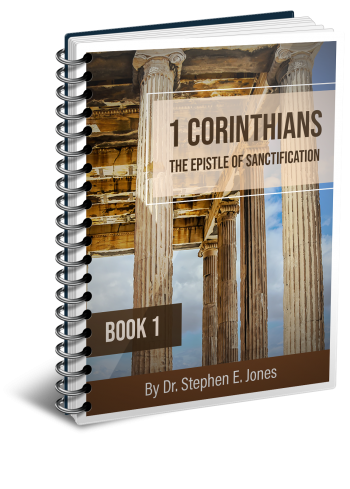Latest Posts
View the latest posts in an easy-to-read list format, with filtering options.

An in-depth commentary/study on the first 6 chapters of First Corinthians.
Category - Bible Commentaries

Paul used the case of the immoral believer as a springboard to teach the church about its duty and responsibility to learn the art of righteous judgment. 1 Cor. 6:1 says,
1 Does any one of you, when he has a case against his neighbor, dare to go to law before the unrighteous, and not before the saints?
The question was rhetorical, because the answer was obvious. It was absurd for Christians to expect righteous judgment from the law courts of a pagan, immoral city. Even so, some in the church may have recommended doing this, in view of the church’s refusal to deal with the problem of incest. Paul had implied earlier in 1 Cor. 5:1 that incest was unlawful among the Greeks. Presumably, a Greek court would condemn such actions.
Paul was concerned that such litigation would only serve to show the city that Christians were little better than the pagans insofar as morality was concerned. It would seem to prove that soulish Christians were no different from soulish pagans. Secondly, it would prove to the unbelievers that the Kingdom being preached did not offer godly government or godly courts. To appeal to ungodly judges was to admit that these were preferable to Kingdom judges.
Such a situation was an embarrassment to Paul.
Paul continues in 1 Corinthians 6:2,
2 Or do you not know that the saints will judge the world? And if the world is judged by you, are you not competent to constitute the smallest [lowest] law courts?
Here Paul refers to the prophecy in Daniel 7:22, when “the time arrived when the saints took possession of the kingdom.” Further, Daniel 7:27 says,
27 Then the sovereignty, the dominion, and the greatness of all the kingdoms under the whole heaven will be given to the people of the saints of the Highest One; His kingdom will be an everlasting kingdom, and all the dominions will serve and obey Him.
A king was considered to be the highest judge in the realm. There were many lower courts, where judges were empowered to judge the disputes among the people. In the Kingdom of God, Jesus Christ is the King and the final Court of Appeal.
The overcomers are called to rule with Him. The overcomers, then, must know the laws of the Kingdom, not only to enforce them, but also to judge the people when those laws are violated. Every time a law is violated, someone’s rights are trampled. If the people cannot resolve their own disputes, they need to be able to take their case to an official court, where a judge can resolve the dispute according to the law.
So Paul says, “the saints will judge the world.” For this reason, he is surprised that the church in Corinth was not competent enough to set up even the lowest court under heaven. Yet even if they had been able to set up a church court, this was no guarantee that they would follow the proper procedure that is set forth in Matt. 18:15-20.
Furthermore, Paul had accused them already of being soulish, and so they ran the risk of judging by outward appearances, rather than by the revelation that comes through the spiritual man. We do not know how much time Paul had spent in training them to judge the world in righteousness. No doubt he had already taught them from the law and the prophets, and he seems surprised that the church was unable to judge the case at hand. But yet, eighteen months of teaching seems insufficient to train righteous judges. The church was still unprepared.
The Corinthian deficiency, however, has become our blessing, for when Paul was compelled to write about it, he instructed many future generations of believers as well. Saints who know the law are able to prevent sin first by teaching people what sin is. John tells us that “sin is the transgression of the law” (1 John 3:4 KJV). If people know what violates the nature of God and what violates the rights of their neighbors, then they are better equipped to be more like Christ and to do no harm to others.
Secondly, those who have greater understanding of the law are able to counsel others in their disputes.
Thirdly, those who excel in their knowledge and understanding of the law, combined with an ability to be led by their spirit, rather than their soul, might be called to rule and reign with Christ as overcomers in the Age to come. Such believers live exemplary lives, for the law is written on their hearts, and they are able also to instruct others in the ways of God. If necessary, they are able to judge disputes, rendering verdicts in accordance with the mind of Christ.
Unfortunately, most Christians today are unprepared and ill equipped to judge the world, because they have followed the example of the Corinthian church. Not many churches knowingly permit immorality in the church, but (1) they tend to lack teaching about the difference between soul and spirit, and (2) they think that the law is unspiritual, so they do not teach it to the people.
Some judge unrighteously—that is, by the power of the soul—while others refuse to judge at all, citing Jesus’ words in Matt. 7:1, “Do not judge, so that you will not be judged.” Paul obviously did not take Jesus’ words to be a prohibition on judging. Jesus was warning people that they will be judged by the same standard of measure by which they judged others (Matt. 7:2).
That was the point of His statement. He was warning against unrighteous judgment. He was referring to the law of equal weights and measures in Lev. 19:35, 36. He was reminding the people also that the law applies equally to the judge as well as the people who are being judged (Num. 15:15, 16). Anyone who judges according to his own soul will be judged by the same standard of measure. Hence, the only safe way to judge is by one’s spirit, which is in turn led by the Holy Spirit.
By God’s standard, not many believers are qualified to judge others. Yet in practice, everyone judges, for we all must judge, discern, decide, and form opinions and beliefs daily. The real question is whether those decisions and beliefs are spiritual truth or merely the opinions of the soul (traditions of men).
It is also important to develop the ability to investigate men’s teachings without deciding too quickly what is true and what is not. Everyone has some level of truth, and so we must have the ability to discern which parts are true and which are not. Often this takes time, especially while investigating certain topics that are new or unfamiliar to us.
For this reason, Paul told the church in 1 Cor. 4:5, “do not go on passing judgment before the time, but wait until the Lord comes.” When He “comes” with the light of revelation, perceived through your spirit, then you are able to judge or discern the truth.
Paul then says in 1 Corinthians 6:3,
3 Do you not know that we will judge angels? How much more, matters of this life.
Paul does not try to explain his statement. It appears that he has already taught this to the church, so he feels no need to explain it further. But it is possible to reconstruct some of Paul’s teaching, if we know the same Scriptures that Paul understood.
First, it is important to know that angels are messengers. Messengers can be either earthly or heavenly. The way Paul uses the term here is in the sense of a heavenly, or spiritual being, for why would the church be required to judge earthly messengers? Further, he says, “How much more, matters of this life,” as if to show a contrast with life in an age to come. The judgment that he speaks of, then, is a future judgment.
Secondly, it is apparent that godly angels do not need to be judged. Hence, it can refer only to angels that have sinned. These can only be the angels referred to in 2 Peter 2:4,
4 For if God did not spare the angels when they sinned, but cast them into hell [lit. “confined them in Tartarus] and committed them to pits of darkness, reserved for judgment…
Tartarus is not the same as hades (“hell”). See chapter 1 of my book, The Judgments of the Divine Law. Again, we read the words of Jesus’ earthly brother in Jude 6,
6 And angels who did not keep their own domain, but abandoned their proper abode, He has kept in eternal bonds under darkness for the judgment of the great day.
Whether these angels sinned prior to Adam or only later in Genesis 6:2 is a matter of theological opinion and is outside our present scope. We can say with certainly that “we shall judge angels,” and that this will occur at “the judgment of the great day”—no doubt the Great White Throne judgment in Rev. 20:11. At the present time, our information about the sin of angels, and the circumstances involved, is sketchy. Full truth has not yet been revealed. Their sin or sins will be revealed clearly at the time of judgment, when all things are known thoroughly.
Meanwhile, Paul tells the church, we ought to prepare to judge not only the world, but also the angels that sinned. Such preparation is mainly twofold: learn to be led by the “new man” of the spirit; and learn the word of God, including the law, the prophets, the psalms, and the New Covenant writings of the apostles.